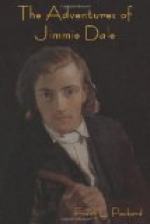He brought the car abruptly to a halt at the edge of the curb, and sprang out to the ground. He was in front of “The Budapest” restaurant, a garish establishment, most popular of all resorts for the moment on the East Side, where Fifth Avenue, in the fond belief that it was seeing the real thing in “seamy” life, engaged its table a week in advance. Jimmie Dale pushed a bill into the door attendant’s hand, accompanied by an injunction to keep an eye on the machine, and entered the cafe.
But for a sort of tinselled ostentation the place might well have been the Marlianne’s that he had just left—it was crowded and riot was at its height; a stringed orchestra in Hungarian costume played what purported to be Hungarian airs; shouts, laughter, clatter of dishes, and thump of steins added to the din. He made his way between the close-packed tables to the stairs, and descended to the lower floor. Here, if anything, the confusion was greater than above; but here, too, was an exit through to the rear street—and a moment later he was sauntering past the front of an unkempt little pawnshop, closed for the night, over whose door, in the murk of a distant street lamp, three balls hung in sagging disarray, tawny with age, and across whose dirty, unwashed windows, letters missing, ran the legend:
IS AC PELINA Pawn brok r
The pawnshop made the corner of a very dark and narrow lane—and, with a quick glance around him to assure himself that he was unobserved, Jimmie Dale stepped into the alleyway, and, lost instantly in the blacker shadows, stole along by the wall of the pawnshop. Old Isaac’s business was not all done through the front door.
And then suddenly Jimmie Dale shrank still closer against the wall. Was it intuition, premonition—or reality? There seemed an uncanny feeling of presence around him, as though perhaps he were watched, as though others beside himself were in the lane. Yes; ahead of him a shadow moved—he could just barely distinguish it now that his eyes had grown accustomed to the darkness. It, like himself, was close against the wall, and now it slunk noiselessly down the length of the lane until he lost sight of it. And what was that? He strained his ears to listen. It seemed like a window being opened or closed, cautiously, stealthily, the fraction of an inch at a time. And then he located the sound—it came from the other side of the lane and very nearly opposite to where, on the second floor, a dull, yellow glow shone out from old Isaac’s private den in the rear of the pawnshop’s office.
Jimmie Dale’s brows were gathered in sharp furrows. There was evidently something afoot to-night of which the Tocsin had not sounded the alarm. And then the frown relaxed, and he smiled a little. Miraculous as was the means through which she obtained the knowledge that was the basis of their strange partnership, it was no more miraculous than her unerring accuracy in the minutest details. The Tocsin had never failed him yet. It was possible that something was afoot around him, quite probable, indeed, since he was in the most vicious part of the city, in the heart of gangland; but whatever it might be, it was certainly extraneous to his mission or she would have mentioned it.




